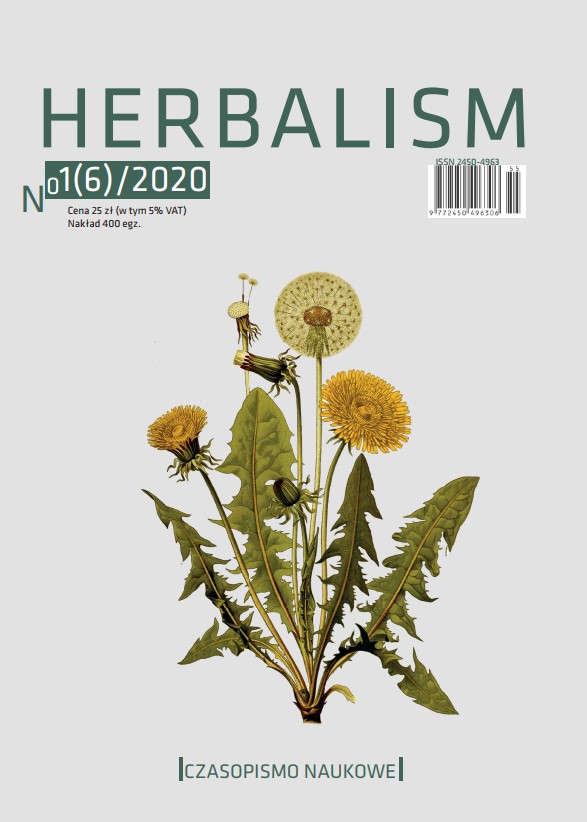The role of herbs in the prevention of diseases related to smog
DOI:
https://doi.org/10.12775/HERB.2020.007Abstract
Smog is a toxic fog present in the atmosphere especially during the heating period. For almost half century it has been known that smog is harmful for health, but only recently appear scientic reports showing in how many diseases smog contributes to worsening the prognosis. The best way to protect against smog is to avoid being in the polluted environment, which is often impossible. To reduce threats of smog, natural products should be used, including herbs with expectorant and antiinammatory effects within the respiratory system. Smog can activate or even cause allergies, that’s why we suggested dietary supplementation plant products such as black seed. Smog can damage not only the respiratory system, but also the circulatory system. Plant products are suitable for the prevention of cardiovascular diseases, for example: berry fruit extracts, grape skin extract rich in resveratrol, ginkgo biloba leaf work. Berries can have a positive e{ect on the oat of the nervous system, which is also at risk of diseases resulting from smog. Bee products such as honey, pollen and propolis are also recommended, as they not only increase the body’s resistance, but also help eliminate heavy metals.
References
Bell M., Davis D.L., Fletcher T., A Retrospective Assessment of Mortality from the London Smog Episode of 1952: The Role of Influenza and Pollution, Environmental Health Perspectives, 2004, 112(1), s. 6–8.
Energy poverty, energy efficiency and air pollution in Poland; the Institute for Structural Research (IBS), 2017, https://ibs.org.pl/en/news/energy-poverty-energy-ecien-cy-and-air-pollution-in-poland/ (stan na dzień 22.11.2019).
Wong T., Smog induces oxidative stress and microbiota disruption, Journal of Food and Drug Analysis, 2017, 25(2), s. 235–244.
Rurarz A., Feleszko W., Smog: nowe zagrożenie w chorobach układu oddechowego dla dzieci oraz metody unikania jego skutków – praktycznie, Terapia, 2017, 11(358), s. 53–56.
Ciślak A. i wsp., The influence of air pollution on the occurrence and decompensation of cardiovascular diseases, and mortality in the population of highly polluted agglomeration, European Heart Journal, 2016, 37(Abstract Supplement), s. 659–660.
Cacciottolo M. i wsp., Particulate air pollutants, APOE alleles and their contributions to cognitive impairment in older women and to amyloidogenesis in experimental models, Translational Psychiatry, 2017, 7, s. 1022–1030.
ESCOP Monographs (Second edition), The Scientific Foundation for Herbal Medicinal Products, Supplement 2009, ESCOP and THIEME, 2009.
Lamer-Zarawska E., Kowal-Gierczak B., Niedworok J., Fitoterapia i leki roślinne, Wydawnictwo Lekarskie PZWL, Warszawa 2007.
Mańkowska D. i Bylka W., Nigella Sativa L. – związki czynne, aktywność biologiczna, Herba Polonica, 2009, 55(1), s. 109–125.
Ansari M. i wsp., Cetirizine and Nigella sativa: comparison of conventional and herbal option for treatment of seasonal allergic rhinitis, Pakistan Journal of Medical Research, 2007, 46(3), s. 58–62.
Zdrojewicz Z. i Belowska-Bieo K., Resweratrol-działanie i znaczenie kliniczne, Advances in Clinical and Experimental Medicine, 2005, 14(5), s. 1051–1056.
Xia L., Ding F., Zhu J.H., Fu G.S., Resveratrol attenuates apoptosis of pulmonary microvascular endothelial cells induced by high shear stress and proinflammatory factors, Human Cell, 2011, 24(3), s. 127–133.
Robich M.P. i wsp., Resveratrol modifies risk factors for coronary artery disease in swine with metabolic syndrome and myocardial ischemia, European Journal of Pharmacology, 2011, 664(1–3), s. 45–53.
Han Y.S., Zheng W.H., Bastianetto S., Chabot J.G., Quirion R., Neuroprotective effects of resveratrol against β-amyloid-induced neurotoxicity in rat hippocampal neurons: involvement of protein kinase C, British Journal of Pharmacology, 2004, 141(6), s. 997–1005.
Albani D., Polito L., Signorini A., Forloni G., Neuroprotective properties of resveratrol in different neurodegenerative disorders, BioFactors, 2010, 36(5), s. 370–376.
Downloads
The publisher's shop:
Published
How to Cite
Issue
Section
License
Copyright (c) 2020 Krzysztof Błecha

This work is licensed under a Creative Commons Attribution-NoDerivatives 4.0 International License.
Stats
Number of views and downloads: 807
Number of citations: 0



